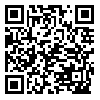1. Terawatts Bradbury. Emotional Quotient. (Translater by Ganji Mehdi).Tehran: Savalan Publication; 2005.
2. Hatami M. Investigating the Degree of behavior Disorders in Children without Parents. Master's Thesis of Clinical Psychology, Univ of Tarbiat Modarres. 1990.
3. KhosrowJavid M. A Study on Validity and Reliability of the Scale of Emotional Quotient in Adolescents. Masters’ Thesis in General Psychology, Univ of Tarbiat Modarres. 2002.
4. Hashiri GR. In Order to Evaluate the Different Aspects of Emotional Quotient of Students (EQ-I), Normalization of Bar-on Emotional Quotient Questionnaire at Universities of Tehran. Faculty of Psychol and Educat Sci, Univ of Allameh Tabatabai. 2003.
5. Asna Ashari N, Sheikh Al-Eslam R. The Mediating Role of Emotional Maturity in the Relationship between Self-Esteem and Social Anxiety in Girl Adolescents. Psychol Methods Models. 2015; 6 (22): 35 – 51.
6. Safarpoor A. Investigation and Study Relationship between Emotional Maturity and Marital Adjustment of Married Men Employed at Tehran Oil Pipelines Company with Healthy and Unhealthy Perception of their Original Families. Tehran: Shahid Beheshti Univ.2007: 34- 55.
7. Ramsden AC. Neuro Psychotherapy. 2000. Available from: URL: http://weekendworkshops.com.au/profile/AncaRamsden.
8. Live J. What is Emotional Maturity 2007. Available from: URL: http://www.Jonathan Live.com/jpg. html.
9. Cole DA, Rehm LP. Family Interaction Patterns and Childhood Depression. J Abnorm Child Psychol. 1994; l4: 297-314.
10. Anna Maria DF, Maureen EK. The Contribution of Emotional Intelligence to Decisional Styles among Italian High School Students. J Career Assess. 2012; 20(4): 404-14. [
Crossref]
11. Hassan J, Saeid J, Hashim F. The Impact of Emotional Intelligence on Communication Effectiveness. Acad J.2014; 6(5):82-7.
12. Hosseini-Nasab SD, Rahimzadeh C. The Relationship between Emotional Quotient and Academic Achievement in Third Grade High School Students (Theoretical Branch) Saghez. 2008; 1(2): 69-94.
13. Yousefi F. The Relationship between Emotional Quotient and Communication Skills of Students. J Iran Psychologists. 2006; 9: 21- 6.
14. Joseph C. Emotional Quotient in Everyday Life (Translated by Asghar Nouri, and Habibollah Nasiri). Tehran: Neveshteh Publications; 2001.
15. Saatchi M. Psychological Tests. Tehran: Edition; 2010.
16. Zahrakar K. Examining the Relationship between Emotional Quotient and Academic Performance. 2007; 2: 97-89.
17. Daniel G. Emotional Quotient as a Management Skill (Translated by Parsa, Nasrin). Tehran: Publications; 2007.
18. Sobhani Nejad M, Youzbashi A. Emotional Quotient and Management in Organization (Theoretical Principles, Methods of Teaching and Assessment Tools. Tehran: Yastoroun Publications; 2008.
19. Bakhshi L. The relationship between Emotional Intelligence mental health and academic performance of girls and boys students in Islamic Azad University of Behbahan Unit. Knowledge and Research in Education –Curriculum Development. 2010; 19: 97-116.
20. Ghaderi D, Ahmadi Reza. The Relationship between Autognosis, Emotional Maturity and Social Security of Students in Kurd City. Quarterly Chaharmahal & Bakhtiari Law Enforcement. 2014; 2(2): 12-28.
21. Sheikh Al-Eslam R. The Relationship betwwen Emotional Intelligence and Academic Satisfaction in Students. Behav Sci. 2012; 5: 135-42
22. Nicole LP. Identification of between EQ Skill and Critical Thinking. J leadersh Educ. 2007; 6: 139-48.
23. Livarajani S, Ghaffari S. Investigating the Relationship between Emotional Quotient and Social Skills and Academic Achievement of High School Students in Tabriz in the Academic Year 2009-10. Educ Eval (Educ Sci). 2010; 3 (9): 71-88.
24. Tamannayifar MR, Seddighi Arfaei F, Salami Mohammadabadi F. The Relationship between Emotional Quotient, Self-Concept and Self-Esteem with Academic Achievement. Research and Planning in Higher Education. 2010; 16(2):56: 99 - 113.
25. AslFattahi B, and Nejarpour O. The Relationship between Emotional Intelligence and selfesteem with Social Skills, Education and Assessment .2014; 6(23):123-36.
26. Nasser Zainab Seed H, Fazalur R, Nabi BJ. Impact of Emotional Intelligence on Team Performance in Higher Education Institutes. Int J Educ Sci. 2011; 3(1): 30- 46.
27. Dehshiri GR. Standardization Emotional Quotient Inventory (EQ-I) to Assess Various Aspects of Emotional Intelligence of Students at Tehran University, a Master's Thesis Psychology. Faculty of Psychology and Educational Sciences, University of Allameh Tabatabai. 2003.
28. Imani R, Moheb N. The Relationship between Emotional Maturity Mothers and Children with behavioral Disorders. Woman and Family Studies. 2011; 2 (6): 29-49.
29. Brad Berry T. Emotional quotient. (Translated by Mehdi Ganji, Editor: Hamze Ganji). Tehran: Savalan Publications. 2005; 6 (23): 123-36.


.png)






